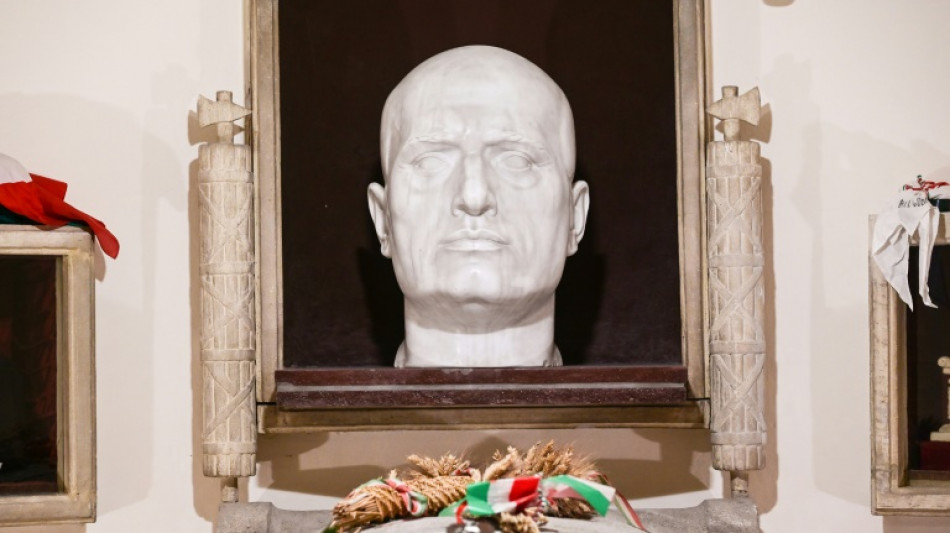
-
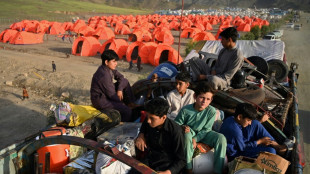 Fleeing Pakistan, Afghans rebuild from nothing
Fleeing Pakistan, Afghans rebuild from nothing
-
US Supreme Court to hear case against LGBTQ books in schools

-
 Pistons snap NBA playoff skid, vintage Leonard leads Clippers
Pistons snap NBA playoff skid, vintage Leonard leads Clippers
-
Migrants mourn pope who fought for their rights
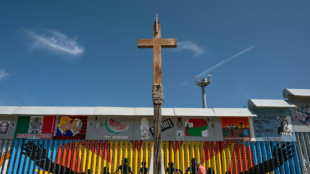
-
 Duplantis kicks off Diamond League amid Johnson-led changing landscape
Duplantis kicks off Diamond League amid Johnson-led changing landscape
-
Taliban change tune towards Afghan heritage sites
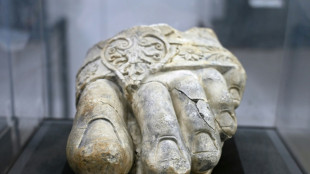
-
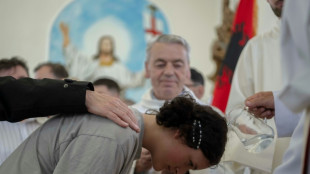 Kosovo's 'hidden Catholics' baptised as Pope Francis mourned
Kosovo's 'hidden Catholics' baptised as Pope Francis mourned
-
Global warming is a security threat and armies must adapt: experts

-
 Can Europe's richest family turn Paris into a city of football rivals?
Can Europe's richest family turn Paris into a city of football rivals?
-
Climate campaigners praise a cool pope

-
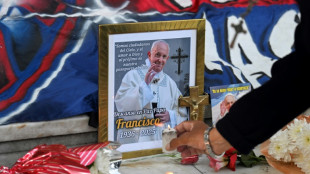 As world mourns, cardinals prepare pope's funeral
As world mourns, cardinals prepare pope's funeral
-
US to impose new duties on solar imports from Southeast Asia

-
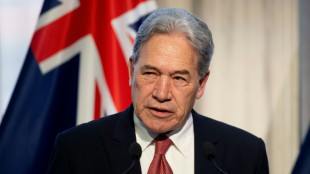 Draft NZ law seeks 'biological' definition of man, woman
Draft NZ law seeks 'biological' definition of man, woman
-
Auto Shanghai to showcase electric competition at sector's new frontier

-
 Tentative tree planting 'decades overdue' in sweltering Athens
Tentative tree planting 'decades overdue' in sweltering Athens
-
Indonesia food plan risks 'world's largest' deforestation

-
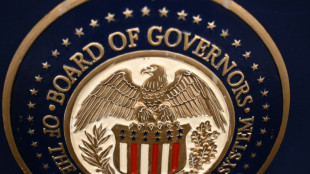 Gold hits record, stocks slip as Trump fuels Fed fears
Gold hits record, stocks slip as Trump fuels Fed fears
-
Trump helps enflame anti-LGBTQ feeling from Hungary to Romania
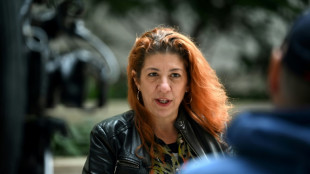
-
 Woe is the pinata, a casualty of Trump trade war
Woe is the pinata, a casualty of Trump trade war
-
'Like orphans': Argentina mourns loss of papal son

-
 Trump tariffs torch chances of meeting with China's Xi
Trump tariffs torch chances of meeting with China's Xi
-
X rival Bluesky adds blue checks for trusted accounts

-
 China to launch new crewed mission into space this week
China to launch new crewed mission into space this week
-
Morocco volunteers on Sahara clean-up mission

-
 Latin America fondly farewells its first pontiff
Latin America fondly farewells its first pontiff
-
'I wanted it to work': Ukrainians disappointed by Easter truce

-
 Harvard sues Trump over US federal funding cuts
Harvard sues Trump over US federal funding cuts
-
'One isn't born a saint': School nuns remember Pope Francis as a boy

-
 Battling Forest see off Spurs to boost Champions League hopes
Battling Forest see off Spurs to boost Champions League hopes
-
'I don't miss tennis' says Nadal

-
 Biles 'not so sure' about competing at Los Angeles Olympics
Biles 'not so sure' about competing at Los Angeles Olympics
-
Gang-ravaged Haiti nearing 'point of no return', UN warns
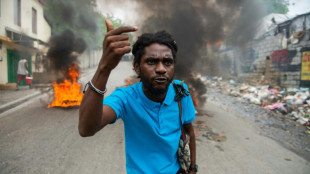
-
 US assets slump again as Trump sharpens attack on Fed chief
US assets slump again as Trump sharpens attack on Fed chief
-
Forest see off Spurs to boost Champions League hopes

-
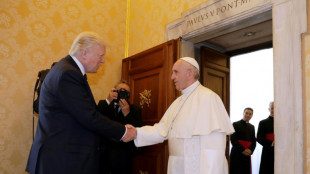 Trump says Pope Francis 'loved the world,' will attend funeral
Trump says Pope Francis 'loved the world,' will attend funeral
-
Oscar voters required to view all films before casting ballots

-
 Bucks' Lillard upgraded to 'questionable' for game 2 v Pacers
Bucks' Lillard upgraded to 'questionable' for game 2 v Pacers
-
Duplantis and Biles win Laureus World Sports Awards

-
 US urges curb of Google's search dominance as AI looms
US urges curb of Google's search dominance as AI looms
-
The Pope with 'two left feet' who loved the 'beautiful game'
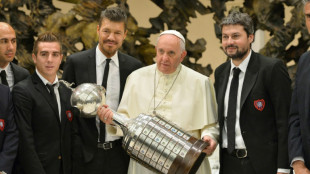
-
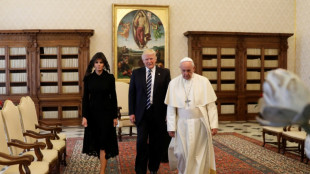 With Pope Francis death, Trump loses top moral critic
With Pope Francis death, Trump loses top moral critic
-
Mourning Americans contrast Trump approach to late Pope Francis

-
 Leeds and Burnley promoted to Premier League
Leeds and Burnley promoted to Premier League
-
Racist gunman jailed for life over US supermarket massacre

-
 Trump backs Pentagon chief despite new Signal chat scandal
Trump backs Pentagon chief despite new Signal chat scandal
-
Macron vows to step up reconstruction in cyclone-hit Mayotte

-
 Gill, Sudharsan help toppers Gujarat boss Kolkata in IPL
Gill, Sudharsan help toppers Gujarat boss Kolkata in IPL
-
Messi, San Lorenzo bid farewell to football fan Pope Francis

-
 Leeds on brink of Premier League promotion after smashing Stoke
Leeds on brink of Premier League promotion after smashing Stoke
-
In Lourdes, Catholic pilgrims mourn the 'pope of the poor'
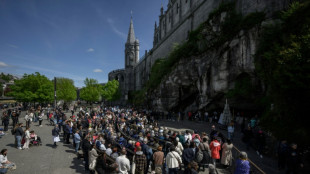

100 years on, nostalgia for Fascism persists in Italy
On October 28, 1922, Benito Mussolini's Fascist blackshirts entered Rome, marking the start of a dictatorship still viewed today with some indulgence in Italy.
The centenary of the so-called March on Rome on Friday comes days after far-right leader Giorgia Meloni was named Italy's new prime minister, renewing debate on the legacy of Fascism.
Although Meloni's Brothers of Italy party has neo-fascist roots, in her first speech to parliament this week she insisted she had "never felt sympathy or closeness to undemocratic regimes... including Fascism".
Yet unlike in Germany or Spain, where only a handful of extremists still revere Adolf Hitler or the Franco dictatorship, attitudes to Mussolini in Italy are more ambiguous.
As recently as 2013, then-Prime Minister Silvio Berlusconi said the racial laws against Jews were "the worst mistake of a leader, Mussolini, who in many other ways had done well".
- Shameful racial laws -
Berlusconi, a billionaire media mogul whose right-wing Forza Italia party is back in government as part of Meloni's coalition, is known for his outbursts.
But the sentiment is not uncommon, notes Valerio Alfonso Bruno, an analyst at the Centre for Analysis of the Radical Right in London.
"A large part of the population has never truly come to terms with Fascism," he told AFP.
Mussolini's authoritarian, anti-democratic regime celebrated military might and intense nationalism.
In Italy, there remains "this cult of the strong personality, the strongman, the autocrat who governs without worrying about democracy", Bruno said.
Mussolini is praised for having provided Italy with much-needed infrastructure, from trains to highways, as well as social welfare programmes -- even if many of these projects were already underway when he took office.
Few, however, defend his record on the race laws. From 1938, the regime began stripping rights from Jews, banning them from public office, forbidding intermarriage, permitting the confiscation of their property and eventually their internment.
Under Mussolini's regime, which ran until July 1943, more than 7,000 Italian Jewish men, women and children were murdered in the Nazi death camps.
In her speech on Tuesday, Meloni called the race laws "the lowest point in Italian history, a shame that will mark our people forever".
Berlusconi's 2013 remarks, on the sidelines of a ceremony marking Holocaust Remembrance Day in Milan, were condemned by the centre-left and many others.
They showed "the extent to which Italy still has trouble seriously accepting its own history and its own responsibilities", the head of the Union of Italian Jewish Communities, Renzo Gattegna, said at the time.
Gattegna's observation is still relevant today.
- 'Heirs of Il Duce' -
According to an October 2021 poll, 66 percent of 16- to 25-year-olds believe Mussolini's Fascist regime was a dictatorship that must be condemned in part, but which also had beneficial effects.
Only 29 percent of those questioned by the Ipsos research institute, on behalf of a national association of former deportees, said Mussolini was to be entirely condemned.
And for five percent, Fascism was considered a positive form of government.
While today, statues of controversial historical figures are being removed in countries such as the United States and Britain, physical reminders of "Il Duce" remain intact throughout Italy.
An obelisk inscribed with the words "Mussolini Dux" still sits a stone's throw from the Olympic stadium in Rome, with no note of context.
Portraits of the dictator still adorn the walls of some government ministries.
And while a post-war law bans the apology for -- or justification of -- Fascism, it is not enforced. Websites flourish online praising the memory of the "ventennio," the two decades Mussolini was in power.
In Predappio, a small town in northern Italy where Mussolini was born and buried, his tomb in the family chapel attracts tens of thousands of visitors each year.
"This memory is certainly tolerated, not just in Predappio," said analyst Bruno. And in recent years, he added, this tolerance of Fascism had increased.
"We are all heirs of Il Duce," said Ignazio La Russa, a member of Meloni's Brothers of Italy party. Recently elected speaker of the Senate, he was speaking on television only last month.
La Russa, who collects Fascist memorabilia including busts of Mussolini, had days earlier been forced to condemn his brother for giving the fascist salute at the funeral of a far-right activist.
Y.Bouchard--BTB


